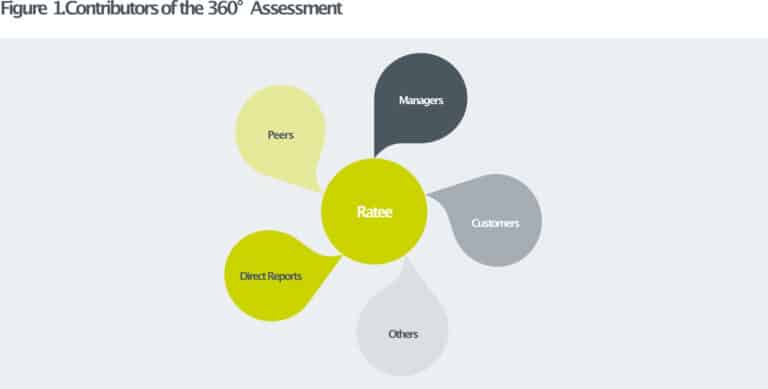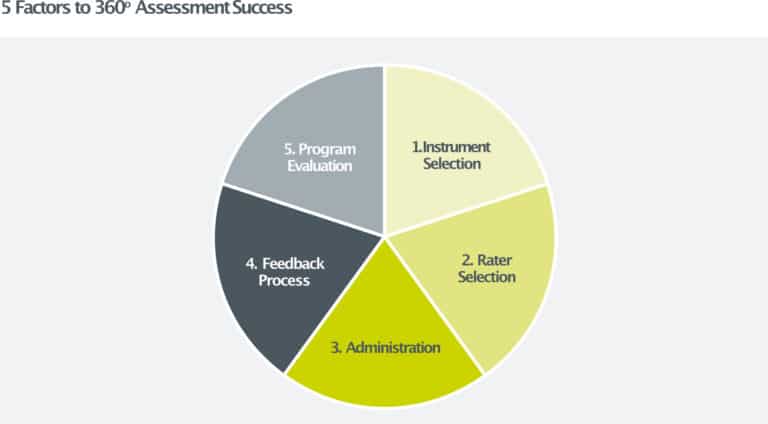What is a 360-degree assessment and why is it beneficial?
A 360-degree assessment is a feedback process where an individual receives feedback from various people in their working environment.
This can include:
- Managers
- Peers
- Direct reports
- Customers or other stakeholders.
This type of assessment is beneficial because it provides a comprehensive view of an individual’s performance, helping to identify strengths, weaknesses, and development areas.
Who are the raters in a 360-degree assessment and what roles do they play?
Raters in a 360-degree assessment include the individual being assessed (the ratee), their managers, peers, direct reports, and potentially customers or other external stakeholders. Each group provides unique insights into the ratee’s performance, offering a well-rounded view of their skills and behaviour.
How do you select the right 360-degree assessment instrument?
Selecting the right instrument involves understanding the assessment’s purpose and considering factors such as price, time commitment, organisational expertise, and potential barriers. There are two main types of instruments: standardised and customised, each with its advantages and considerations.
What is the process for administering a 360-degree assessment?
Administering a 360-degree assessment involves careful planning, establishing clear timelines, ensuring that the purpose of the assessment aligns with the organisation’s goals, and maintaining transparency and trust throughout the process. Effective communication with all stakeholders is crucial for a successful assessment.
What is a performance review and how is it different from a 360-degree assessment?
◆ Similarities: How They Relate
-
Employee Evaluation:
- Both are used to evaluate an employee’s performance and competencies.
-
Development Focus:
- They aim to identify areas for personal and professional development.
-
Feedback Mechanism:
- Both provide feedback to the employee, which is crucial for their growth and improvement.
-
Involvement of Multiple Perspectives:
- While the approach may differ, both methods can incorporate feedback from various stakeholders.
◆ Difference: How They Differ
-
Cohorts:
While Performance Reviews are beneficial for a range of employee levels and types of roles, given the nature of 360 Assessments and what they measure, these assessments are most suitable for supervisor and leadership roles.
-
Focus Areas:
- 360 Degree Assessments emphasise behavioural aspects and competencies, whereas Performance Reviews tend to concentrate more on measurable achievements and objectives.
-
Frequency and Timing:
- 360 Degree Assessments are usually conducted less frequently (i.e. biennially or every few years) and timed with significant leadership changes (e.g. moving from Team Leader to Manager, or General Manager to Executive), while Performance Reviews are more regular (quarterly or annually) for ongoing performance monitoring.
-
Purpose and Use:
- 360 Degree Assessments are most effectively used for leadership growth and development and are best paired with leadership coaching and/or leadership development programs, whereas Performance Reviews not only focus on growth and development but are often linked to salary and promotion considerations, as well as any formal performance management processes.
-
Impact on Career:
- Outcomes from 360 Degree Assessments are generally used for personal growth and development, while Performance Reviews can directly influence career progression, including salary and promotional decisions.
How is feedback provided in a 360-degree assessment?
Feedback is typically provided by a professional coach, either internal or external to the organisation, in a manner that is objective and constructive. The feedback session aims to help the ratee understand their results, leverage strengths, develop weaknesses, and set improvement goals.
What steps should be taken to ensure effective feedback and development post-assessment?
Post-assessment, it’s recommended to have at least three coaching sessions to help the ratee develop based on the feedback. This process should involve setting and tracking progress towards development goals, with a focus on sustainable behaviour change.
How can you ensure confidentiality and trust in the 360-degree assessment process?
Ensuring confidentiality and trust involves being clear about what ‘confidential’ means in the context of the assessment, establishing who will see the feedback, and under what circumstances. Ratees should also be clear about the expectations post-feedback and the support available to them.
What are the common challenges in 360-degree assessments and how can they be mitigated?
Challenges include ensuring the timely completion of assessments, managing the potential biases of raters and internal coaches, and ensuring ratees’ engagement with the assessment and feedback process. These can be mitigated through careful planning, using external coaches when necessary, and ensuring the assessment, feedback and development have alignment with organisational goals.
How do you evaluate the success of a 360-degree assessment program?
Success can be evaluated on four levels:
- ratees’ reactions,
- learning outcomes,
- changes in workplace behaviour,
- organisational outcomes.
This evaluation involves various methods, such as questionnaires, interviews, and performance metrics, and should be conducted at different stages following the program completion.







